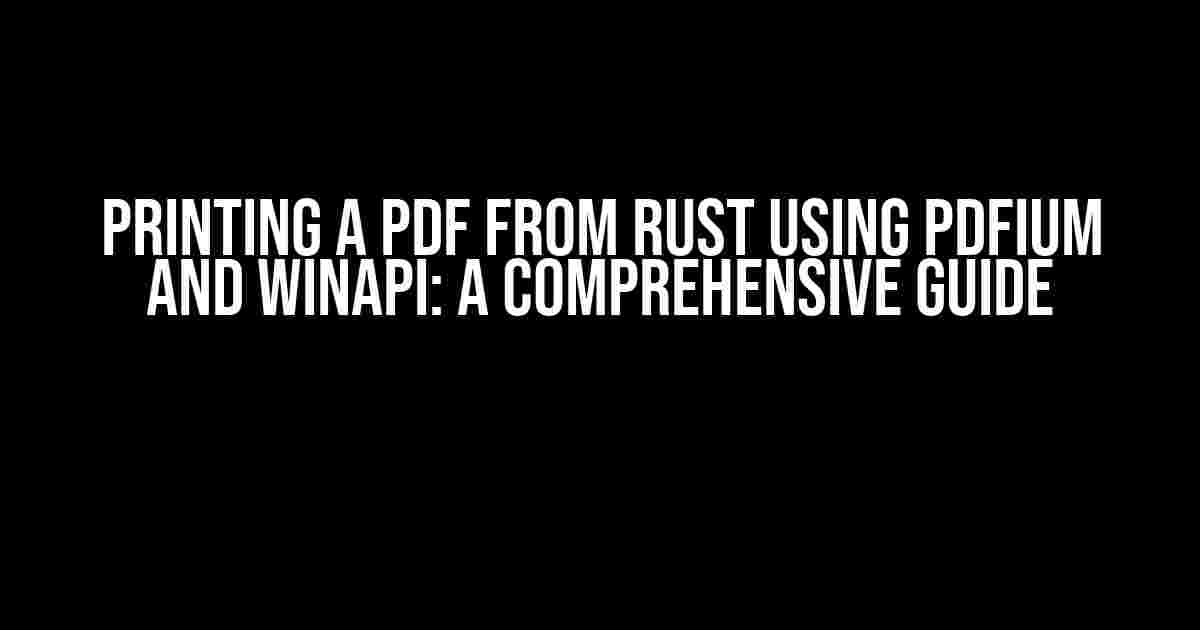Are you tired of struggling to print PDFs from your Rust application? Do you want to leverage the power of Pdfium and WinAPI to simplify the process? Look no further! In this article, we’ll take you on a step-by-step journey to print PDFs from Rust using Pdfium and WinAPI. Buckle up, and let’s dive in!
What is Pdfium?
Pdfium is a open-source PDF library developed by Google. It’s a powerful tool that allows you to render, print, and manipulate PDFs with ease. Pdfium provides a C++ API, which can be easily bound to Rust using the pdfium_sys crate.
What is WinAPI?
WinAPI is a set of APIs provided by Microsoft for developing Windows applications. It allows you to interact with the Windows operating system, access hardware devices, and perform various system-level tasks. In our case, we’ll use WinAPI to print the PDF document.
Setting up the Project
Before we start, make sure you have Rust and Cargo installed on your system. Create a new Rust project using the following command:
cargo new print_pdf --binAdd the following dependencies to your Cargo.toml file:
[dependencies]
pdfium_sys = "0.20.0"
winapi = { version = "0.3.9", features = ["winapi/x86_64-pc-windows-msvc"] }We’ll use the pdfium_sys crate to interact with the Pdfium library, and the winapi crate to print the PDF document.
Loading the PDF Document
First, we need to load the PDF document using Pdfium. Add the following code to your main.rs file:
use pdfium_sys::*;
use std::path::Path;
fn main() {
// Load the PDF document
let pdf_path = "path/to/your/pdf/document.pdf";
let pdf_path = Path::new(pdf_path);
let pdf_data = std::fs::read(pdf_path).unwrap();
let pdf_buffer = pdf_data.as_ptr() as *const FPDF_BYTE;
let pdf_buffer_len = pdf_data.len() as FPDF_SSIZE;
// Create a new Pdfium instance
let pdfium = FPdf_LoadMemDocument(pdf_buffer, pdf_buffer_len, 0);
}Make sure to replace "path/to/your/pdf/document.pdf" with the actual path to your PDF document.
Printing the PDF Document
Now that we have the PDF document loaded, let’s print it using WinAPI. Add the following code to your main.rs file:
use winapi::shared::minwindef::{LPARAM, LRESULT, WPARAM};
use winapi::shared::windef::HWND;
use winapi::um::winuser::{MessageBoxW, PostMessageW};
// Get the handle of the default printer
let printer_name = "Default Printer";
let printer_name_wide: Vec = printer_name.encode_utf16().collect();
let printer_handle = winapi::um::winspool::OpenPrinterW(&printer_name_wide, std::ptr::null_mut(), std::ptr::null_mut());
// Create a new print job
let print_job = winapi::um::winspool::StartDocPrinterW(printer_handle, 1, &printer_name_wide);
// Print the PDF document
let pdf_data = pdfium.GetPageBitmap(pdfium, 0, FPDF_IMAGE_FORMAT_BMP, FPDF_PRINTSCALE_NOSCALE, 0, 0, 0, 0);
let pdf_data_ptr = pdf_data.as_ptr() as *const u8;
let pdf_data_len = pdf_data.len() as u32;
let print_info = winapi::um::winspool::DOCINFOW {
cbSize: std::mem::size_of::() as u32,
lpszDocName: printer_name_wide.as_ptr(),
lpszOutput: std::ptr::null_mut(),
lpszDatatype: std::ptr::null_mut(),
fwMode: 0,
};
winapi::um::winspool::StartPagePrinter(printer_handle);
winapi::um::winspool::WritePrinter(printer_handle, pdf_data_ptr, pdf_data_len, &mut pdf_data_len);
winapi::um::winspool::EndPagePrinter(printer_handle);
winapi::um::winspool::EndDocPrinter(printer_handle);
// Close the print job
winapi::um::winspool::ClosePrinter(printer_handle);
This code creates a new print job, prints the PDF document, and closes the print job.
Handling Errors
It’s essential to handle errors when working with Pdfium and WinAPI. Add the following error handling code to your main.rs file:
fn main() -> Result<(), Box> {
// ...
if pdfium.is_null() {
return Err("Failed to load PDF document".into());
}
if printer_handle.is_null() {
return Err("Failed to open printer".into());
}
if print_job == 0 {
return Err("Failed to start print job".into());
}
// ...
Ok(())
}
This code checks for errors when loading the PDF document, opening the printer, and starting the print job.
Putting it all Together
Now that we have all the code in place, let’s put it together. Here’s the complete main.rs file:
use pdfium_sys::*;
use std::path::Path;
use winapi::shared::minwindef::{LPARAM, LRESULT, WPARAM};
use winapi::shared::windef::HWND;
use winapi::um::winuser::{MessageBoxW, PostMessageW};
use winapi::um::winspool::{ClosePrinter, DOCINFOW, EndDocPrinter, EndPagePrinter, OpenPrinterW, StartDocPrinterW, StartPagePrinter, WritePrinter};
fn main() -> Result<(), Box> {
// Load the PDF document
let pdf_path = "path/to/your/pdf/document.pdf";
let pdf_path = Path::new(pdf_path);
let pdf_data = std::fs::read(pdf_path).unwrap();
let pdf_buffer = pdf_data.as_ptr() as *const FPDF_BYTE;
let pdf_buffer_len = pdf_data.len() as FPDF_SSIZE;
// Create a new Pdfium instance
let pdfium = FPdf_LoadMemDocument(pdf_buffer, pdf_buffer_len, 0);
if pdfium.is_null() {
return Err("Failed to load PDF document".into());
}
// Get the handle of the default printer
let printer_name = "Default Printer";
let printer_name_wide: Vec = printer_name.encode_utf16().collect();
let printer_handle = OpenPrinterW(&printer_name_wide, std::ptr::null_mut(), std::ptr::null_mut());
if printer_handle.is_null() {
return Err("Failed to open printer".into());
}
// Create a new print job
let print_job = StartDocPrinterW(printer_handle, 1, &printer_name_wide);
if print_job == 0 {
return Err("Failed to start print job".into());
}
// Print the PDF document
let pdf_data = pdfium.GetPageBitmap(pdfium, 0, FPDF_IMAGE_FORMAT_BMP, FPDF_PRINTSCALE_NOSCALE, 0, 0, 0, 0);
let pdf_data_ptr = pdf_data.as_ptr() as *const u8;
let pdf_data_len = pdf_data.len() as u32;
let print_info = DOCINFOW {
cbSize: std::mem::size_of::() as u32,
lpszDocName: printer_name_wide.as_ptr(),
lpszOutput: std::ptr::null_mut(),
lpszDatatype: std::ptr::null_mut(),
fwMode: 0,
};
StartPagePrinter(printer_handle);
WritePrinter(printer_handle, pdf_data_ptr, pdf_data_len, &mut pdf_data_len);
EndPagePrinter(printer_handle);
EndDocPrinter(printer_handle);
// Close the print job
ClosePrinter(printer_handle);
Ok(())
}
.Compile and run the code using the following command:
cargo runIf everything goes smoothly, your PDF document should be printed successfully!
Conclusion
In this article, we’ve demonstrated how to print a PDF document from Rust using Pdfium and WinAPI. We’ve covered loading the PDF document, printing it, and handling errors. With this guide, you should be able to print PDFs from your Rust application with ease.
FAQs
Frequently Asked Questions
Get ready to uncover the secrets of printing PDFs from Rust using pdfium and winapi!
What is pdfium and how does it help me print PDFs in Rust?
Pdfium is a powerful, open-source PDF rendering engine developed by Google. When combined with Rust and winapi, it allows you to interact with PDFs programmatically, including printing them! By leveraging pdfium’s rendering capabilities and winapi’s Windows-specific functionality, you can create a Rust application that prints PDFs with ease.
How do I integrate pdfium with my Rust project?
To integrate pdfium with your Rust project, you’ll need to add the pdfium-rs crate as a dependency in your Cargo.toml file. From there, you can import the necessary modules and use pdfium’s API to load, render, and print your PDFs. Additionally, you’ll need to ensure you have the pdfium-binaries installed on your system.
What is winapi and why do I need it to print PDFs in Rust?
Winapi is a Rust crate that provides a safe and idiomatic interface to the Windows API. When it comes to printing PDFs, winapi allows you to interact with the Windows printing subsystem, enabling your Rust application to send PDFs to the printer. By combining winapi with pdfium, you can create a seamless printing experience for your users.
Can I customize the printing process using pdfium and winapi in Rust?
Absolutely! Both pdfium and winapi provide a range of customization options for the printing process. With pdfium, you can adjust rendering settings, layout, and more. Meanwhile, winapi allows you to specify printer settings, paper sizes, and print quality. By combining these customization options, you can tailor the printing experience to your users’ needs.
Are there any examples or resources available to help me get started with printing PDFs in Rust using pdfium and winapi?
Yes! There are plenty of resources available to help you get started. Check out the pdfium-rs and winapi crates on GitHub, which provide extensive documentation, examples, and tutorials. You can also explore online forums, such as the Rust subreddit, and Stack Overflow, where you can find answers to common questions and get help from experienced developers.



